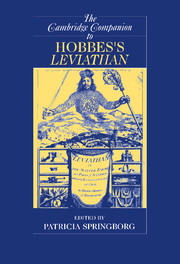Book contents
- Frontmatter
- General Introduction
- Part I: Of Man
- Part II: Of Commonwealth
- Part III: Of a Christian Commonwealth
- 10 Hobbes’s Covenant Theology and Its Political Implications
- 11 Omnipotence, Necessity and Sovereignty: Hobbes and the Absolute and Ordinary Powers of God and King
- 12 Hobbes on Salvation
- 13 Hobbes and the Cause of Religious Toleration
- Part IV: Of the Kingdom of Darkness
- Part V: Hobbes’s Reception
- Bibliography
- Index
- Series List
10 - Hobbes’s Covenant Theology and Its Political Implications
from Part III: - Of a Christian Commonwealth
Published online by Cambridge University Press: 28 November 2007
- Frontmatter
- General Introduction
- Part I: Of Man
- Part II: Of Commonwealth
- Part III: Of a Christian Commonwealth
- 10 Hobbes’s Covenant Theology and Its Political Implications
- 11 Omnipotence, Necessity and Sovereignty: Hobbes and the Absolute and Ordinary Powers of God and King
- 12 Hobbes on Salvation
- 13 Hobbes and the Cause of Religious Toleration
- Part IV: Of the Kingdom of Darkness
- Part V: Hobbes’s Reception
- Bibliography
- Index
- Series List
Summary
INTRODUCTION
The reassessment of Hobbes's theology achieved in the last twenty years has produced three tendencies that now seem well entrenched among scholars. The first is to acknowledge the importance of that part of the philosopher's thinking; second, to admit its indissoluble links with Hobbes's political theory; and third, to recognize its heterogeneous, and in many ways strongly heterodox, nature. Ironically, the recent publication in the German original of Leo Strauss's provocative and illuminating analysis of Hobbes's critique of religion, and its welcome translation into French, appear to be the culmination of this process, although the book was written some seven decades ago. One aspect of Hobbes's religious doctrine has been less frequently addressed, and that is the presence in his writings of various elements of covenant theology. To the extent that it has been treated, this topic has generated several types of commentary that seem to invite discussion. It is my contention that these commentaries rely on a partial and mistaken understanding of what covenant theology is about, and that they consequently fail to establish its proper relation to Hobbes's theory. After a brief outline of covenant doctrine, I will argue here that, to a great extent, Hobbes's consistent although subversive brand of covenant theology shapes the formal structure of his approach to Christian religion; that it cannot be properly understood unless placed in a political perspective; and that its very singularity helps explain the peculiar character of Hobbesian political theology.
- Type
- Chapter
- Information
- The Cambridge Companion to Hobbes's Leviathan , pp. 243 - 270Publisher: Cambridge University PressPrint publication year: 2007
- 6
- Cited by

